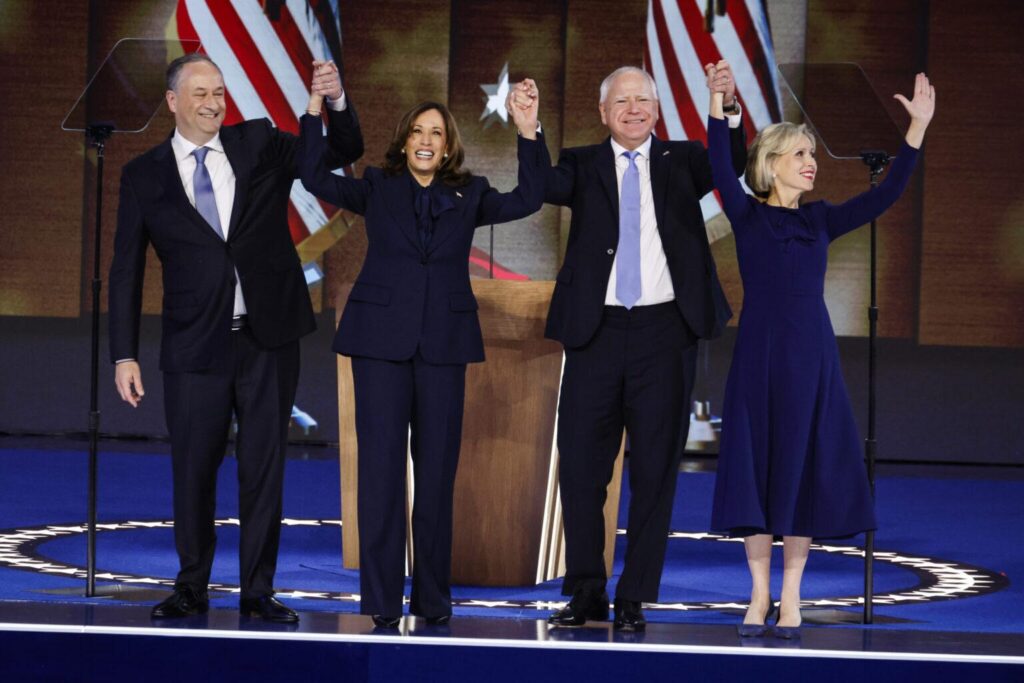In the cutthroat world of politics, the battlefield extends beyond the physical realm into areas of rhetoric and posturing for power. As the United States gears up for another presidential election, Donald Trump and Kamala Harris are engaged in a strategic dance to win over voters with promises of military might and national security. In this article, we take a closer look at how these political heavyweights are jockeying for the high ground on military strength, and the implications of their strategies on the future of the nation’s armed forces.
Trump and Harris present competing visions for military investment
President Trump and Vice President Harris have each outlined their visions for military investment, showcasing their divergent approaches to bolstering national defense. Trump aims to prioritize traditional military capabilities, such as increasing the size of the Navy and investing in new fighter jets. On the other hand, Harris emphasizes the importance of modernizing the military through advancements in cyber warfare and space technology.
- Trump focuses on expanding the Navy fleet and investing in new fighter jets.
- Harris prioritizes modernizing the military through cyber warfare and space technology.
| Trump’s Vision | Harris’s Vision |
|---|---|
| Increasing Navy fleet size | Advancements in cyber warfare |
| Investing in new fighter jets | Enhancements in space technology |
As the two leaders engage in a competition for high ground on military strength, their differing approaches reflect broader debates within the national security community about the future of warfare. Trump’s emphasis on traditional capabilities resonates with some military experts, while Harris’s focus on modernization appeals to those advocating for a shift towards 21st-century threats. The outcome of this competition will likely shape the trajectory of U.S. military policy for years to come.
Analyzing the contrasting defense strategies of the candidates
As the 2024 presidential election draws nearer, both Donald Trump and Kamala Harris are ramping up their defense strategies to showcase their commitment to military strength. While their approaches differ significantly, both candidates are vying for the high ground when it comes to national security.
Trump’s defense strategy focuses on bolstering the military through increased spending and a strong stance on international relations. On the other hand, Harris emphasizes modernizing the military and investing in new technologies to stay ahead of potential threats. Both candidates are also prioritizing cybersecurity as a crucial aspect of national defense, recognizing the evolving nature of warfare in the digital age.
Recommendations for maximizing military strength in the upcoming election
With the upcoming election approaching, both Trump and Harris are navigating ways to maximize their military strength to appeal to voters. Here are some recommendations for each candidate:
- Trump: Focus on his track record of increasing military spending and strengthening national defense.
- Harris: Emphasize her support for veterans and commitment to modernizing the military.
Furthermore, both candidates should consider highlighting their plans for enhancing cybersecurity and addressing emerging global threats to showcase their readiness to lead the country’s armed forces. By demonstrating a clear strategy for bolstering military strength, Trump and Harris can position themselves as strong and capable leaders in the eyes of voters.
The role of military alliances in shaping national security agendas
Trump and Harris are both vying for dominance in military alliances, with each touting their own approach to shaping national security agendas. Trump, known for his “America First” stance, emphasizes the importance of self-reliance and sovereignty in military matters. Harris, on the other hand, champions the strength of partnerships and alliances in promoting global security.
Despite their differing views, both candidates recognize the crucial role that military alliances play in shaping national security agendas. The competition between Trump and Harris reflects a broader debate within the political landscape on the best approach to ensuring the safety and security of the nation. As the election approaches, the question of military strength and alliances will undoubtedly remain at the forefront of the national discourse.
Key Takeaways
As Trump and Harris continue to make their respective cases for who can best protect and strengthen our military, it remains to be seen how their positions will play out in the upcoming election. Both candidates are clearly committed to ensuring the security and strength of our armed forces, but their approaches differ significantly. With so much at stake, voters will have to carefully weigh their options and decide which candidate they believe is best suited to lead our military into the future. The fight for military superiority is far from over, and only time will tell who will emerge victorious in this high-stakes battle.


